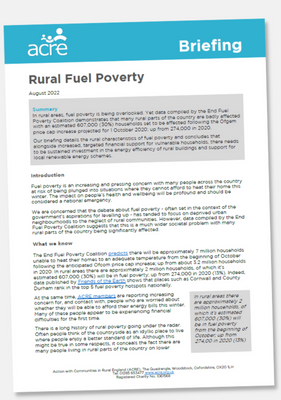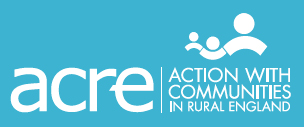30 percent of rural households could be in fuel poverty this winter
Action with Communities in Rural England (ACRE) joins calls for urgent, decisive, and sustained action to tackle the fuel crisis, but insists the specific vulnerabilities and needs of rural households must not be overlooked.
Estimates of the number of people who will find themselves in situations where they cannot afford to heat their home this winter are staggering. The End Fuel Poverty Coalition estimates that following the anticipated Ofcom price cap rise in October, approximately 7 million households in England will meet the official criteria of being in fuel poverty, up from 3.2 million households in 2020.
Rural communities have tended to be forgotten in the debate about fuel poverty. However, recent research suggests that some rural parts of the country such as Cornwall and County Durham are amongst some of the places most affected. Across the country, 607,000 rural households are expected to be fuel poor this winter which is equivalent to 30.3% of the population in the countryside.
Simon Francis, Coordinator of the End Fuel Poverty Coalition said: “The scale of the fuel crisis facing us this winter means that no part of the country will escape this societal blight and should be considered a national emergency. Our data shows that many rural households will find themselves in financial difficulty for the first time this year.”
In response to the findings, Action with Communities in Rural England (ACRE) has published a briefing outlining what it sees as the rural characteristics of fuel poverty and the actions it believes are needed to avert crisis in the countryside this winter.
Speaking of the situation, Richard Quallington, Executive Director of ACRE said, “The fact rural parts of the country are some of the worst affected is no surprise to us. Much of the housing stock in the countryside is older and more difficult to heat and many households still depend on heating oil which is not subject to the price cap. This, combined with typically lower rural incomes and the cost of travelling to access jobs and services is creating the perfect storm in the countryside. The challenge for policy makers is twofold. They need to find ways of getting more financial support to the people who most need it, and this requires more creative localised responses in rural communities. And there also needs to be a longer-term plan for improving the energy efficiency of homes which is suited to the fabric of older buildings. The needs of rural communities cannot be overlooked”.
Notes to editors
Media contact: Phillip Vincent, p.vincent@acre.org.uk, 01285 425645
ACRE (Action with Communities in Rural England) is a charity speaking up for and supporting rural communities. It is the national body of the ACRE Network, England’s largest rural grouping of community support charities which together reach over 35,000 community groups annually, and lever in over £34 million each year in support of initiatives that equip people with the knowledge, skills, and connections needed to improve their local community.
ACRE is a member of the End Fuel Poverty Coalition, a broad coalition of over 60 anti-poverty, environmental and health campaigners, local authorities, trade unions and consumer organisations campaigning to influence government and other bodies to take action and end fuel poverty.
The predictions from the End Fuel Poverty Coalition closely reflect Government official definitions of fuel poverty. Some other campaigners are using different measurements and predict that the numbers affected by the impact of rising energy prices will be far higher.
ACRE is also undertaking a survey of England’s 10,000+ village halls to understand how the energy crisis is impacting their operations and the support they will need to become more energy efficient.
“The fact rural parts of the country are some of the worst affected is no surprise to us”
Richard Quallington. Executive Director of ACRE



